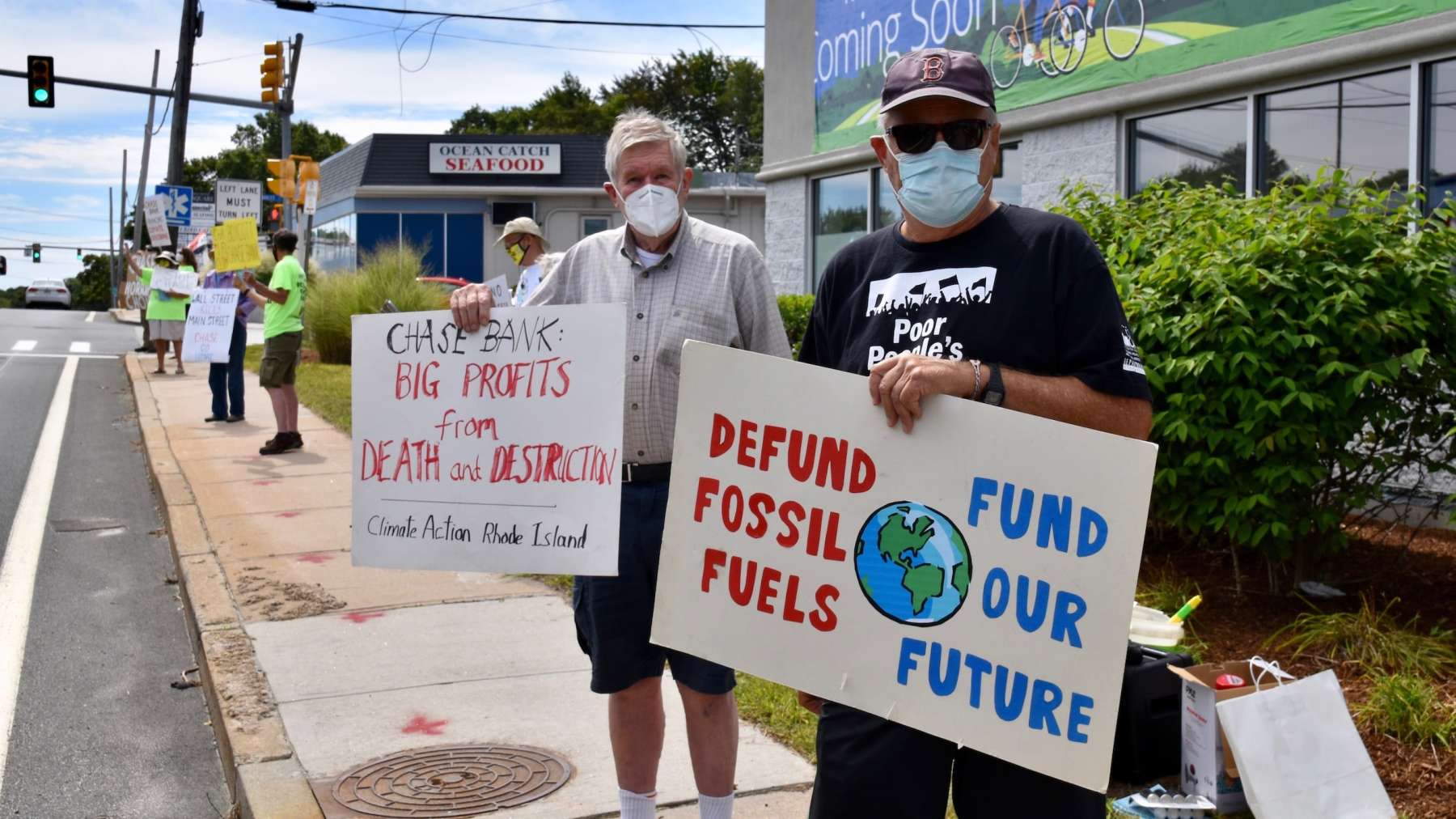Climate Action RI protests outside Chase Bank Branch in Wakefield
“In the four years since the Paris Climate Agreement however, Chase Bank has led the world in funding fossil fuel projects by financing $269 billion around the world (36% more than the next top funder), $102 billion of which went for fossil fuel expansion. With Lee Raymond, former Exxon chairman and the architect of the successful national climate denialism campaign,
September 1, 2020, 9:37 am
By Steve Ahlquist
“In the four years since the Paris Climate Agreement however, Chase Bank has led the world in funding fossil fuel projects by financing $269 billion around the world (36% more than the next top funder), $102 billion of which went for fossil fuel expansion. With Lee Raymond, former Exxon chairman and the architect of the successful national climate denialism campaign, on Chase’s board for decades, Chase is prioritizing its short-term fossil fuel profits over the health of the planet and of us.“
A group of current and retired University of Rhode Island (URI) faculty released a statement ahead of a Monday morning protest by Climate Action Rhode Island (CARI) held outside the location of a new branch of Chase Bank in Wakefield.
“We are highly concerned that the climate crisis is far worse than commonly understood as evidenced in the new book Our Final Warning: Six Degrees of Climate Emergency by Mark Lynas which summarizes the current climate science,” write Don Hermes, URI Professor Emeritus (Geology); Peter Nightingale, URI Professor (Physics), Jacqueline Sparks, URI Professor (Human Development and Family Science) and Martina Muller, URI Post-Doctoral Research Fellow (Natural Resource Sciences).

“There is a clear consensus among the world’s climate scientists that the burning of fossil fuels is heating the planet and much faster than previously thought, and that the use of fossil fuels must be dramatically and very quickly reduced in order to mitigate a global catastrophe that has already begun, including in the United States. The United Nations projects our current path will lead us to between 200 million to one billion homeless climate refugees in the next 30 years.
“In the four years since the Paris Climate Agreement however, Chase Bank has led the world in funding fossil fuel projects by financing $269 billion around the world (36% more than the next top funder), $102 billion of which went for fossil fuel expansion. With Lee Raymond, former Exxon chairman and the architect of the successful national climate denialism campaign, on Chase’s board for decades, Chase is prioritizing its short-term fossil fuel profits over the health of the planet and of us.
“In January, a report by two of Chase Bank’s own economists, one the head of its European banking, was leaked which said that if business as usual continues:
“’…the climate crisis will impact the world economy, human health, water stress, migration and the survival of other species on Earth…. We cannot rule out catastrophic outcomes where human life as we know it is threatened…. Something will have to change if the human race is going to survive.‘
“Top-level Chase Bank economists cannot be dismissed as alarmists.

“Because of the urgency of the climate crisis, we have joined forces with a community group Climate Action Rhode Island-350 which, in coordination with many other climate groups around the country, is opposing Chase Bank. We are demanding that Chase Bank stop funding new fossil fuel projects, phase out funding for current fossil fuel projects, reinvest this money in renewable energies, and pay reparations for the current and future environmental damage to Rhode Island which they are funding and for their longstanding national pattern of discrimination against and redlining of Black, Brown, and Indigenous people. (See: Activists Want Reparations From Chase Bank For Chicago’s Black Neighborhoods.)
“Until that happens, we, along with many other groups around the country, are holding protests at Chase Bank branches and calling on people to join our protest movement, boycott Chase, and cut up their Chase credit cards. There’s even a growing demand from Chase shareholders which our networks helped organize, Chase Shareholders Call for Action.”



















